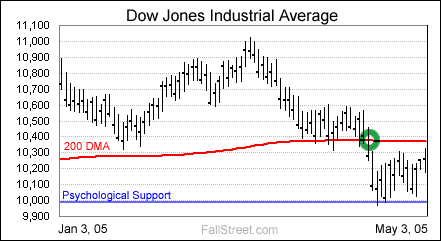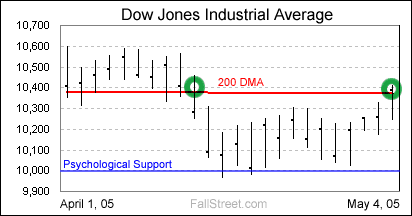|
Looking Back
On May 16, 2000 the Fed raised interest rates by 50 bp and said, “the risks are weighted mainly toward conditions that may generate heightened inflation pressures in the foreseeable future”. In hindsight, it is easy to reason that since the stock market collapse in early 2000 presaged a sharp decline in capital spending that inflation was not a major threat. Nevertheless, after the Fed raised interest rates in May 2000 they kept their goggles fixated on inflation until mid-November: “risks continue to be weighted mainly toward conditions that may generate heightened inflation pressures in the foreseeable future.” Then along came December 2000:
“The drag on demand and profits from rising energy costs, as well as eroding consumer confidence, reports of substantial shortfalls in sales and earnings, and stress in some segments of the financial markets suggest that economic growth may be slowing further…the Committee consequently believes that the risks are weighted mainly toward conditions that may generate economic weakness in the foreseeable future.”
The lesson of 2000 is that economic turning points are difficult to predict beforehand, even at the Fed.
Looking Ahead
In April 2005 the Dow and S&P 500 joined the Nasdaq to trade below their 200 DMA’s, an onslaught of weaker than expected economic reports arrived, and the threat of inflation – seemingly in an instant – was trumped by the threat of economic slowdown. Yet despite all of this gloom the Fed raised interest rates for the eight time in a row earlier this week and promised to continue taking away ‘accommodation’ in a manner that is likely to be ‘measured’ in the future. Not unlike 2000, the combination of a weakening economy contrasted to a hawkish Fed brings only one word to mind: uncertainty.
Uncertainty Truly Abounds
In recent weeks Lawrence Kudlow has penned a pessimistic outlook, Ralph Acampora has said (in March/April) that the NASDAQ has already seen its highs for 2005, and the usually optimistic Bruce Bartlett has been throwing around the dreaded ‘R’ word. If nothing else, 2005 is already a memorable year in that some old dogs have learned some new tricks.
With this in mind – and given that long-time pessimists like Roach are finally close to cracking a grin - it is as if we have reached an entirely new echelon of uncertainty; a level of uncertainty wherein so many potentially destabilizing events are at risk of transpiring that no one dares seem too optimistic (except of course the Fed and now Kerkorian). To be sure, there is the threat of the commodities super cycle, the global housing bubble, the US budget/trade deficit nightmare, and the conundrum of interest rates. Add to these concerns the increasing threat of protectionism and the near guarantee of continued FX volatility, and it is clear that with every Fed rate hike uncertainty, which has been plentiful for some time, is nonetheless multiplying.
Uncertainty Arouses Waffling
Fleck sees stagflation, but leaves the door open for other, different possibilities:
“There's obviously a good chance that, when the stock market really tanks and the real-estate market goes with it, and given all the debt that's piled up, we could experience the break to deflation that many people are expecting.”
Then there is Acampora – a man who once predicted that the Dow would trade inside of a 4,000 point range with a straight face – who continues to possess the uncanny knack of offering completely different forecasts within the same forecast.
“…this rally now has, in our opinion, a two fold purpose: first, aggressive traders should take long positions in anticipation of potentially quick rebounds; and secondly, investors should use any strength to lighten-up on positions...” April 18, 2005.
Whether the markets go up or down, Acampora saw it coming?
Lastly there is Buffett, who said yesterday on CNN that “you never want to go short on America”. Patriotism is all fine and well, but the onlooker could easily argue that Buffett - who is already betting against the US dollar and holding a passive short against US stocks via his $40 billion war chest - is about as short on America as he can possibly be.
Everyone is Hedging except Roach
With perseverance and insightful writing Roach has become the mother of all bears, and, unlike Acampora, Fleck, and Buffett, there is no waffling in Roachland. To be sure, more than 3-years ago Roach was theorizing that a ‘global decoupling’ loomed, that a ‘US-centric global economy’ would be forsaken by the ‘over-extended American consumer’, and that ‘the classic business cycle model offers little insight into what now lies ahead’ (quotes from January-April 2002). Today Roach has settled on an old favorite: ‘Federal Reserve doesn’t have a viable post-bubble exit strategy’.
Conclusions & Company Watch
The Fed has resorted to taking their FOMC statements on a trial run to see how the markets respond before final revisions, the 30-year T may be coming back (what ever will the Fed modelers do?), JP Morgan said yesterday that China will revalue ‘any day now’, and Kerkorian announced to the world that he wants to own GM (instead of say quietly filing and trying to accumulate GM shares/debt). These events highlight what has been a strange week already, and two trading sessions still remain. During these two sessions the Dow will battle its 200 DMA - a level that looked unattainable on Tuesday, but was beaten yesterday.
 |
 |
Suffice to say, the macro landscape is as uncertain as I can ever remember it. And while economic turning points are extremely difficult to predict beforehand, it is nonetheless beginning to look a lot like 2000.
As for the possibility of soon dispersing some cash into the marketplace, UST is fairly valued at current prices and could be solid long-term investment. I also think – despite some NBP renewal issues – that TC Pipelines is fairly valued and a potential buy on weakness. Lastly, Calavo could be an attractive holding below $10/share (although the Mexico sales outlook is, admittedly, still a little vague).
|